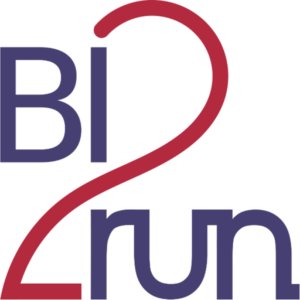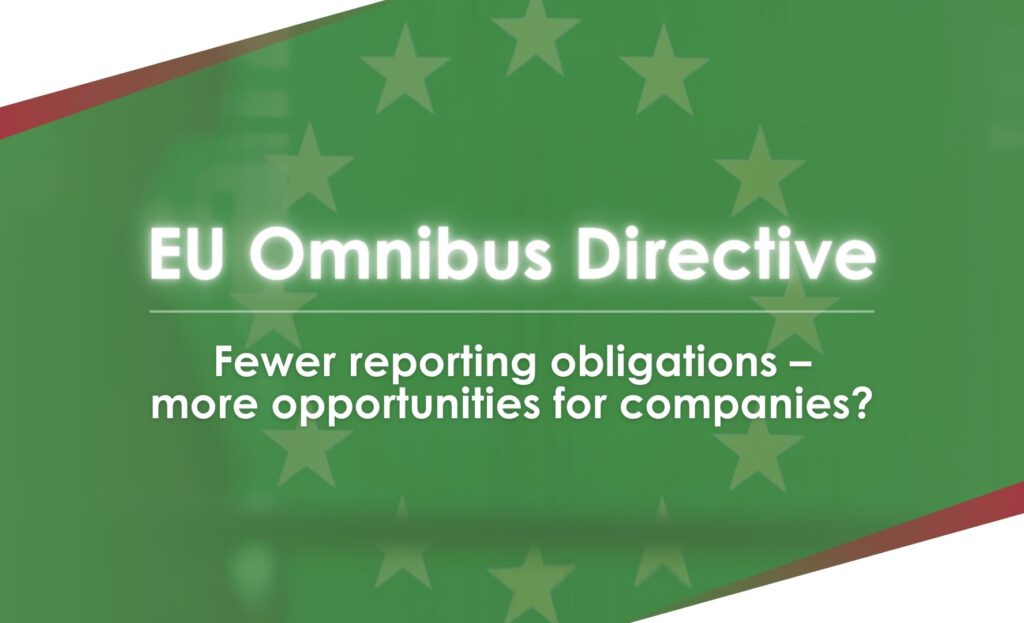On February 26, 2025, the European Commission published the EU Omnibus Directive to simplify sustainability regulation. But what is behind these changes for companies?
The European Commission published its Omnibus Initiative on February 26, 2025, which provides for significant simplifications for companies in sustainability reporting. The declared aim is to reduce reporting obligations for large companies by 25% and for SMEs by as much as 35%. This development comes at a time when many companies are in the middle of implementing the existing ESG regulations.
CSRD: Significant increase in thresholds due to Omnibus Directive
The most striking change concerns the CSRD thresholds. In the future, only companies with more than 1,000 employees and either a turnover of more than 50 million euros or a balance sheet total of more than 25 million euros will be required to report – regardless of their legal form.
In concrete terms, this means:
- Companies with fewer than 1,000 employees are completely exempt from the CSRD obligation – including capital market-oriented SMEs
- Companies with more than 1,000 employees that were not covered by the previous NFRD will be given two more years and only have to report for the 2027 financial year
- Third-country companies will only be required to report if they generate over 450 million euros in turnover in the EU or have an EU subsidiary with a turnover of over 50 million euros
A Voluntary Reporting Standard based on the VSME is to be introduced for smaller companies. Suppliers of companies subject to CSRD may only be surveyed in accordance with these simplified standards under the EU Omnibus Directive.

Audit obligation remains limited
The feared tightening of the audit obligation does not materialize. Auditors will still only have to carry out an audit with limited assurance. The previously planned extension to reasonable assurance has been rejected. Instead, special guidelines for auditors are to be published in 2026.
The planned sector-specific ESRS standards will not be introduced. Instead, the number of ESRS data points is to be reduced. However, the principle of double materiality will remain in place.
EU taxonomy: drastic restriction of the scope of application
There is also considerable relief in the EU taxonomy:
- Only companies with over 1,000 employees and over 450 million euros in turnover are now required to report
- Voluntary reporting for companies with over 1,000 employees but less than 450 million euros in turnover
- Reduced scope: it is sufficient to determine the taxonomy-compliant share of turnover and CapEx (capital expenditure); the OpEx share (operating expenditure) becomes optional
- Partial compliance possible: companies can indicate that they only fulfill parts of the technical assessment criteria
The reporting templates and Do No Significant Harm (DNSH) criteria are to be simplified, which should facilitate practical implementation.
CSDDD: Focus on direct suppliers
The following changes are on the horizon for the CSDDD:
- Postponed start date: National implementation by mid-2027, application for companies with over 5,000 employees only from financial year 2028
- Limited scope: Due diligence obligations are limited to direct suppliers (Tier 1)
- Extended audit intervals: Suppliers only have to be audited every five years instead of annually
- Relief for smaller suppliers: Suppliers with fewer than 500 employees may only be asked to provide information from the Voluntary Standard for Small and Medium Enterprises (VSME)
Strategies for implementing the new ESG requirements
The reform of ESG reporting presents companies with both challenges and opportunities. While the bureaucratic burden is reduced, the need to strategically focus on sustainability issues remains. Companies should now take active measures to best prepare for the new requirements;
1. Use of voluntary standards as a strategic benefit
Even if many companies are no longer obliged to report, the voluntary application of the VSME standards can be a competitive advantage. Investors and business partners increasingly prefer companies with transparent and credible ESG data.
2. Optimization of internal sustainability processes
The reduced scope of reporting offers an opportunity to optimize internal ESG processes. Companies should focus on establishing efficient data collection systems and integrating the sustainability strategy into the overall corporate strategy.
3. Strengthening supply chain management
Even if the CSDDD requirements have been limited to direct suppliers, good transparency in the value chain remains essential. Companies should improve their purchasing practices in order to proactively manage risks.
4. Early implementation of new reporting formats
Companies that are subject to the new reporting requirements should not wait for the final adoption of the law. Establishing a solid ESG reporting structure early on can facilitate future adjustments and minimize regulatory uncertainties.
Despite all the simplifications: Sustainability reporting will remain a key issue. Companies that set up their systems and processes now will create competitive advantages – regardless of regulatory requirements.
What does the Omnibus Directive mean for your company?
The amendments have not yet been finally adopted. Nevertheless, they provide an opportunity to rethink your ESG strategy:
- Check whether you are affected: Do you fall under the new thresholds?
- Adapt strategy: Which implementation steps make sense?
- Keep an eye on the supply chain: Due diligence obligations remain despite simplifications
- Ensure data quality: Investing in good ESG data pays off in the long term

Next steps in the political process
The proposals still have to be confirmed by the European Parliament and the Council of the European Union. Adoption requires:
- A simple majority in the European Parliament
- A 55% majority in the Council (15 out of 27 member states), representing 65% of the EU population
A decision is expected by mid-2025. Once adopted, the member states have 12 months to transpose it into national law.
Your expert for ESG compliance
Contact us now and get started through the jungle of ESG requirements. Our data experts will help you to identify the right key figures and establish sustainable business processes – pragmatically and with your corporate goals in mind.
🚀 Tip: Sustainability is becoming mandatory. Check whether your company is prepared with our free ESG/CSRD checklist – in just 15 minutes!







